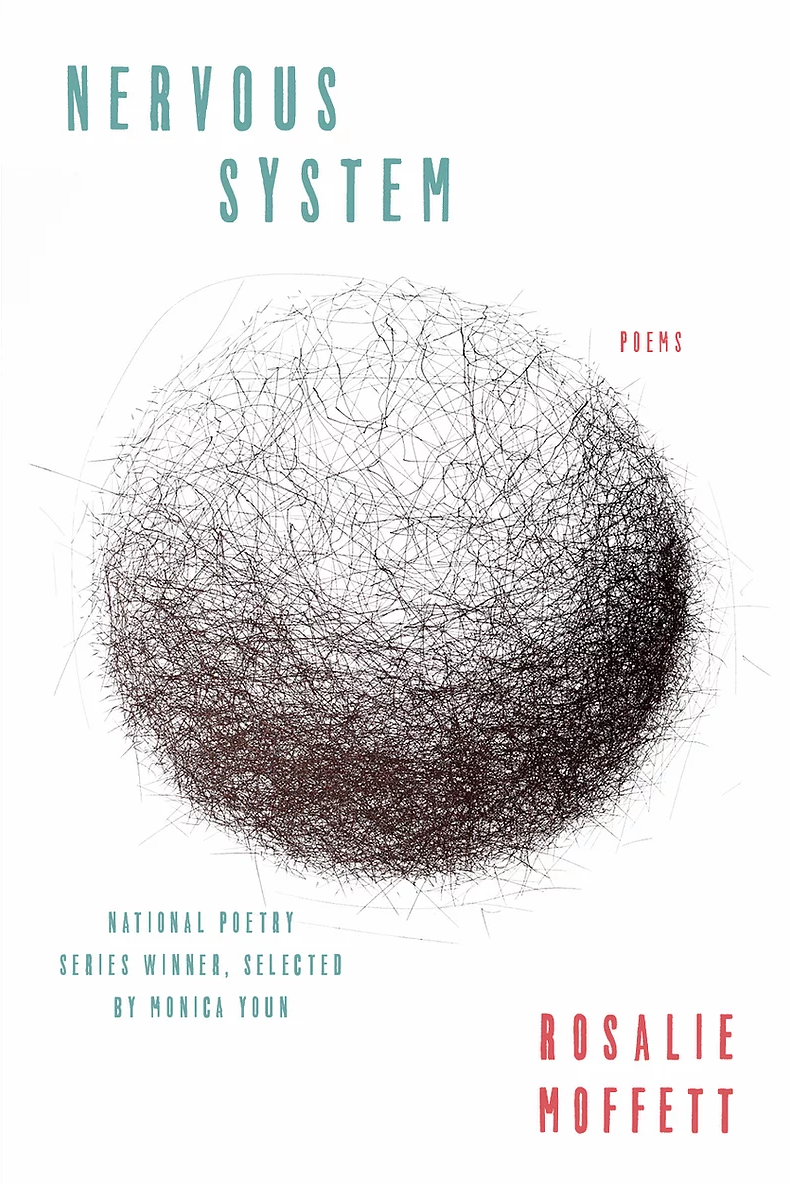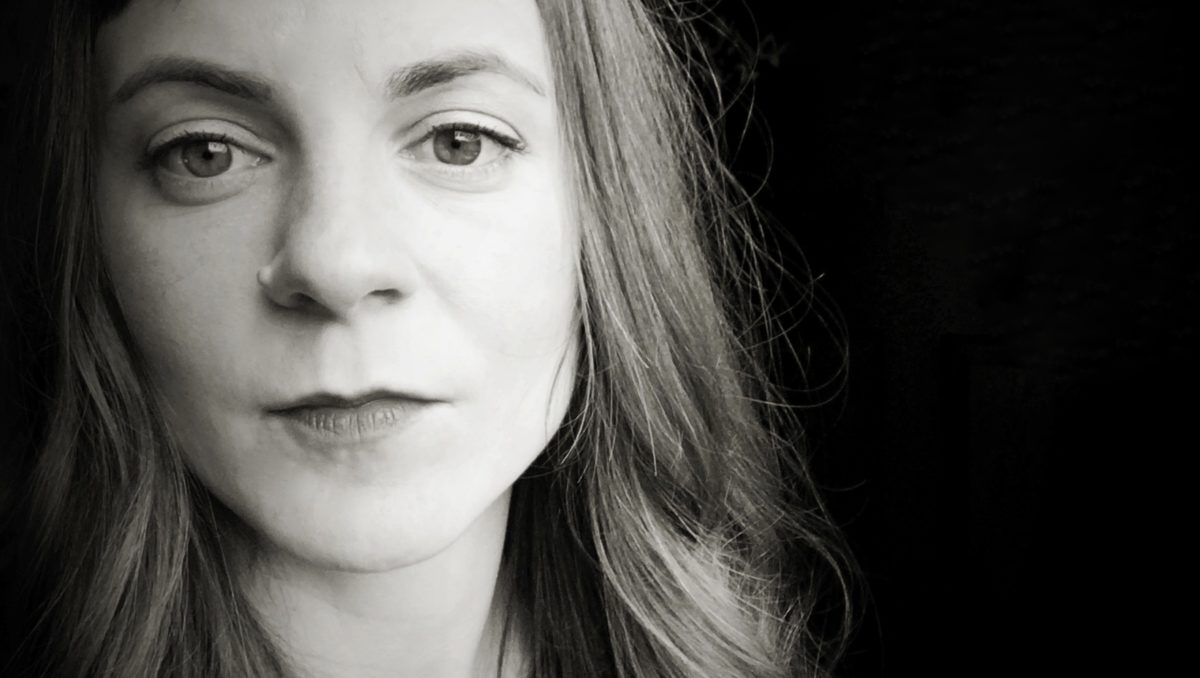MONTHLY WITH Rosalie Moffett

FOUR POEMS
INTERVIEW
Rosalie Moffett is the author of Nervous System (Ecco) which was chosen by Monica Youn for the National Poetry Series Prize, and listed by the New York Times as a New and Notable book. She is also the author of June in Eden (OSU Press). She has been awarded the “Discovery”/Boston Review prize, a Wallace Stegner Fellowship in Creative Writing from Stanford University, and scholarships from the Tin House and Bread Loaf writing workshops. Her poems and essays have appeared in Tin House, The Believer, New England Review, Narrative, Kenyon Review, Ploughshares, and elsewhere. She is an assistant professor at the University of Southern Indiana.

FOUR POEMS by Rosalie Moffett
READ THE PAIRED INTERVIEW WITH ROSALIE MOFFETT
IN SOUND MIND
A jet drags its noise
across my side of town, trawling
for something. Its shadow,
a small black insect, crawls
across house after house. Up and up, over
and over, a lithe little dark thought. I, too
have had a weeviling-through, my sunny
sensibility bedeviled by a pest. Up there, sky-high,
do you, as you go, know the feeling
you slough? Here, when you heft a sack
of flour and watch it cough
into the air one brown moth,
is your knee-jerk reaction Finally!
Some honesty! A thought can worm
and worm its own tangle of unseen tunnel
in the mind for years before things begin
to collapse. Before a word is allowed
out, flapping towards a lamp. Those dummies,
given the rotten meat up-teeming
with maggots, assumed spontaneous generation.
Now we know: flies. Humming thing aloft
in the air. Something descending
to seed a swarm of drear: what
even is the point or so what or what
have you: ruinous little voice-over. I drown
it out however I can. Once, I resorted
to a colander, accidentally fluffed
up a cloud as I sifted mealworms
from flour. Are you, like me, uneasy
with ruin? Do you feel a pity for the blue
your jet plane rakes through, or for me,
whose single-edition sky is getting striped
with white scrapes? Listen, I need to stop
making up gods to talk to
who can’t hear me. Sorry for conjuring you
too aloof, earmuffed and far—
I don’t know how else to be
authentic to my experience. Forgive
me my mind’s circumscribed
design of you, made quick in the shadow
of a small, harmless darkness. Sometimes
one bleak thought breeds in the mind.
No one actually knows, I was shocked
to learn, why moths spiral
towards artificial light—perhaps
they are making
the same mistake as me, desiring
just one moment to speak with
what ruins them.
ODE TO JESSICA
For Jessica Farquhar
If you’re ever in trouble,
find a mother, said Jessica
to her child, refreshing
my predilection for animal videos
where one is raising another’s young,
e.g. the cat with kittens
plus a duckling & the voice
behind the camera announcing
in wonder: it arrived right as she gave birth, like,
get the timing right, a mother
will mother anything. Like,
flip the floodlight & everything
lit up is up for nurturing. Thousands of videos
like this, I swear, exist, inadvertently or deliberately
buttressing her advice in a world
where it’s unwise
to find a policeman or CEO or comedian
or president. America’s
fertility rate is down, the daunt
of saving enough to stave off
progeny-debt is enough
to stall even the reckless.
I’ve a dim view, but it’s true
my brain’s been re-routing frustration
and bungling through a process
that, magic-8-ball-like, produces
the solution: have a baby. Little wailing
thing. When feeling low, I scroll
through online lists of expenses
for the first year of life. It never fails
to make everything worse.
Once, I read an article
about a woman who joined
a search party searching for her. For hours,
she looked for herself.
I am supposed to be finding a mother.
I’m staring at the blank in my bank balance.
God knows the best prayers
one can say in America are to the patron saints
of student debt, of Ca$h for Gold,
of the lowest of the low
deductibles. Oh, God knows
I know the last thing
the world needs is more
people, it’s so full up with policemen,
gun nuts, florists, pundits, artists,
landfills, Jessica, kneeling
face-level with her son, Jessicas
ready to kneel face-level
with anyone’s son.
TAXES, ICECAPS, CROCUSES
In the bank account, it is
unseasonably mild. The businessmen
who live there rarely break
a sweat, whereas it is, elsewhere,
unseasonably disastrous. Wildfire.
Flooding. Diseases unreasonably
rising up, little ghosties, from
the permafrost melt. It is everything
anyone talks about, though the seasoned
businessmen never go anywhere
near the copier, the water-cooler, the arenas
of anyone. Meticulous, they maintain
their distance and their coin
-colored comb overs coiffed into hieroglyphs
of I’ll be dead before any of this
shit hits the fan. By many accounts, an account
is a story, and thus money is a moral
available solely to an upper crust mostly
into fan fiction: Goodnight moon. Goodnight
congressman. Sayonara taxes,
icecaps, crocuses. The bank account can be
summoned by the right spell of two
point authentication—presto: see the men
gazing through the boardroom
window at the view, which is the mountainous
horizon, which is a jagged line graph.
X-axis: months. Y-axis: the accrual
of funds. In the bank account,
there’s a potted plastic palm whose leaves
shift in the manner of blades catching light
in a knife-fight. The businessmen take
solace in the view, they take
turns watering the palm, they take money
and turn back to the window. They keep
the money. They keep watering. Water outside keeps
rising. Inside there’s a weird black spot
developing on the carpet. They were told it was there
to give them a sense of the exterior world.
They were informed that it was, for their safety
decorative. This was about the palm
whose faux trunk pokes down into styrofoam.
But in the bank account, they don’t listen, which is
corporate policy, which is for their safety
and to maintain their equilibrium in case
a message weasels in from the gate
intercom re: some faulty product, some leaky
lifeboat in the polar ice cap
melt. Despite that, and also though
they were sure they’d made, as young men,
strict provisions against such an act,
they were beguiled
by the idea that they might
nurture one quiet thing. They keep
watering. The mold loves the moisture, the micro-
fiber playground, it throws its personal confetti
of deadly spores. Even now, it advances
over the carpet, army-crawling
towards the loafers with the slit at the toe
where, tucked, is a hundred dollar bill. Suppose
this is a fable. Moreover, suppose there is a moral
to be made from the world
anyone can imagine, a lesson, a hinge
between it and the inside
of the mind. Suppose you entertain
this idea for your own comfort
in the manner of tending
to the kind of plant that, turns
out, grows more and more
suspect the longer
it neither blooms nor fruits.
NEST EGG
Logging in to check the pie graph
of one’s 401K: boring miserly pastime
of the 21st century. No lovely clunk
of a gold doubloon, just Scrooge
and his TIAA CREFF password.
Just Scrooge McDuck and his new bird-body.
My first time in Georgia it was August
& I was aghast at the snow
floating in the blue sky. (Hide your eyes,
McDuck, each time we find ourselves
driving in the wake of a chicken truck.)
Point is, most miracles
can be pinned on other people
amassing money in offshore accounts.
Once, I saw rocks light up on the bank
as the surf crashed in: true phenomenon
of phosphorescent plankton. Once, the power
went out in a packed stadium,
and the ring of stands fired up with that exact
blue-white plankton-light from flipped
open flip phones. From above, there must’ve been
one shining eye in the pitch black
of the rest of Dakar. The pie graph
is a joke: it shows only what you have now
as if that’s enough to illuminate enough
of a patch of the quiet dark
of the future. Ah, Scrooge, I know
the balm of a tall stack of coins. I, like you,
have a nest of fear. I like you best
as a bird. I read how domestic ducks
neglect their eggs, which must be
electrically incubated. Warm bulb which nursed
current from the wall-socket to make you
take form, made you take all the currency & hold it
to the light to see if it could be changed
from coin to mirror, from mirror to periscope
to peer into the unknown. Ah, Scrooge, it feels
like it works, doesn’t it? You were the first
duck to dip your spatz into an olympic pool
of money—even as you dove, even as the children
rubbed, in disbelief, their fists across the dollar signs
in their eyes, someone watched
the scales shift, felt the digits of the budget
loosen their chokehold.
- Published in Monthly, Uncategorized
INTERVIEW WITH Rosalie Moffett
READ THE POEMS PAIRED WITH THIS INTERVIEW
FWR: In my first read of “In Sound Mind”, I was struck by how you play with sound throughout the poem (such as the lines “Up there, sky-high,/ do you, as you go, know the feeling/ you slough?”). Can you speak about the growth of this poem? How does consonance (and dissonance!) influence your process– if at all?
Rosalie Moffett: I think I’ve been gravitating towards letting sound lead the way during this particular political period, and this pandemic—I’ve been angry, sad and with something overly simple to say stuck in my craw. Which makes a boring poem. A hallway you can see the end of from the beginning. But to let sound in as a guide gives that hallway some doors, some new avenues. There are then things behind doors that I have to shift in order to see. It opens rooms in my thoughts I didn’t know were there. Which certainly happened in this poem.
And (if you forgive me my wandering into some more conjectural territory) back in high school when I was obsessed with the weird experiments conducted in service of psychology and sociology, I remember learning about cognitive dissonance. In one study, participants were asked to either hold a pencil by pursing their lips, or in their teeth, like a rose. Rough approximations of a frown and a grin. They were then told jokes. Those with the pencil in their teeth found the jokes funnier. In short, the brain said “I must think these are funny, I’m smiling.” The brain likes to follow the body’s lead. Out loud, the mouth makes a rough smile in weeviling, feeling, bedeviled. Makes a rough frown when saying I don’t know, No one knows. I say all this not to claim my poems are smart enough to play these sounds like an emotional piano, but to offer that the sound of a poem might be working on our cognition in ways that are deeply layered and complex. I trust it to lead me through a poem.
FWR: There’s sly humor in these poems, particularly in “Nest Egg” with its addresses to Scrooge McDuck, that carves a new path to the emotional heart of each poem. It serves to buttress the associative leaps you make through the poems and expand on the emotional surprise. How do you see humor in your work?
Moffett: Humor is the PPE gear my mind wears, the way I can make something dark harmless enough to look at. There’s that old chestnut: tragedy + time = comedy. Often, when you’re too close to something, you can’t see the humor in it. If you train yourself to see the comedy, it’s like instant distance. (Instadistance™) You can see how humor could serve as a survival tactic, a jetpack out of actually facing something–and I think there’s a danger of that to be aware of in writing poems. But it’s also, I think, a useful way to gain perspective. Make something funny, and you can look down at it as if from a great height. What is also true is that this training (if you’ll let me call it that) makes a 2-way street. You can zoom in and see the tragic in something that, at first, seems funny. Scrooge McDuck? A duck obsessed with something he can’t eat? Swimming in coins? Oh, honey. What have we made.
Some of my zooming-in involves digging into granular and aspects of things populating my poems. Little of my “research” ends up in the poem (and I defy any algorithm to make sense of my internet searches). For this poem, I did a lot of reading about the character of Scrooge McDuck (yes, his was the first depiction of a swimming pool of money) and got to feel kind of close to him, a kinship. At some point in his history, he changed–someone took pity and shifted him from a miser (clinging to what he couldn’t even make use of) into a philanthropist. I wish that same hand would take pity on me.
FWR: I love your last images, whether Jessica kneeling with “anyone’s son” or the plant that neither “blooms nor fruits”. How do you know when you’ve ‘stuck the landing’ in a poem? Are there poems that you admire for their endings?
Moffett: If only, like in gymnastics, one could look up and see the score from judges!
I think what I look for is that feeling that my mind is standing, so to speak, on a new patch of land. A new vantage point. A poem, uniquely, is a negotiation with white space, with absence. Each line and stanza break are little perches from which to consider that absence. And that last line is where the reader stops, as if at the edge of a cliff, to look out. If there’s something still ringing, something hovering in the mind’s eye, demanding attention, OK. Good.
The cliff came up suddenly in Carrie Fountain’s poem “The Jungle” and then there I was, looking over the edge, ringing.
- Published in Interview, Monthly, Uncategorized
